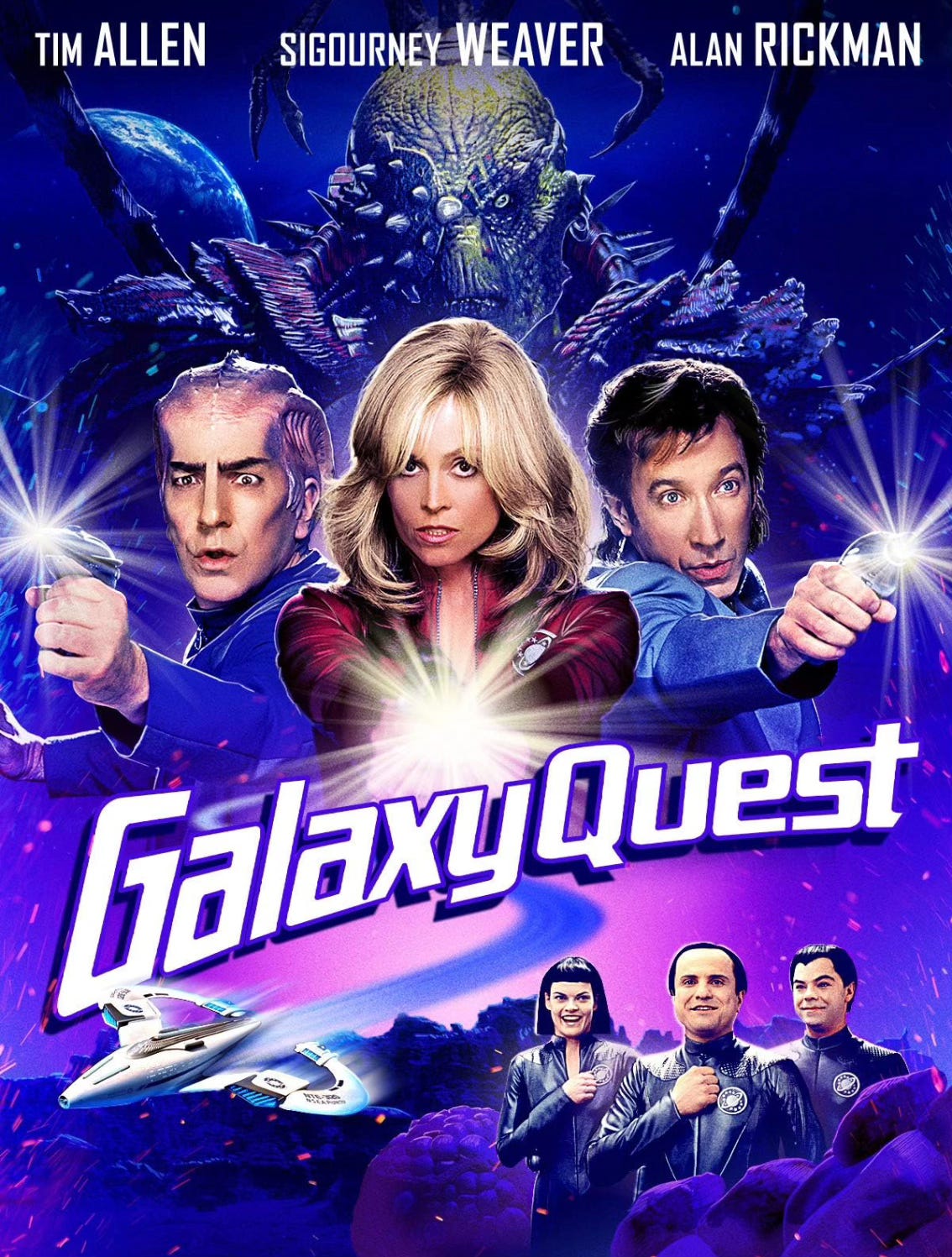‘Galaxy Quest’ and the Virtue of Making Fun of What We Love
This movie is no ordinary Star Trek parody.
Making fun of something you hate is not fun. An air of superiority taints any joke. It’s seldom funny, and it often just comes across as mean-spirited.
But making fun of something you love can be fun. You’re picking on it with genuine affection, acknowledging that, yeah, parts of it are rather silly but you still love it anyway. In a sense, you’re making fun of yourself too. It’s all part of not taking ourselves too seriously.
Case in point: the 1999 movie Galaxy Quest, which draws its inspiration from the original Star Trek. It’s part parody, part love letter, part original comedy, part wish-fulfillment fantasy, and a solid story in its own right.
Directed by Dean Parisot, the movie features a rather large cast, but screenwriters David Howard and Robert Gordon give everyone their own desires, flaws, and moments of triumph. Galaxy Quest divvies up its screen time better than some actual Star Trek movies.
As the movie starts, Galaxy Quest is merely a canceled TV show with a devoted fan base. It’s the Star Trek of this reality. Tim Allen plays Jason Nesmith, who played Captain Taggart, who is basically Captain Kirk. The Spock role goes to Alan Rickman, who portrays a serious actor who’s bitter about having been typecast as an alien in a cheesy sci-fi series. Sigourney Weaver’s character’s character is a comment on the sexism of old TV shows; her job on the ship was to deliver verbal instructions to the computer, even though it would have been more efficient for everyone else to just do it themselves.
Additionally, the cast (and cast within the cast) includes Tony Shalhoub, playing a stoner actor who played the ship’s engineer; Daryl Mitchell as a grown-up child actor who played the young prodigy who piloted the ship; and Sam Rockwell as an actor who played a nameless crew member in a single episode, the sort of officer who tends to have a short lifespan.
The actors’ glory days are behind them. Sci-fi conventions and promotional stunts fill their days now. They still have enthusiastic fans, some of whom are a bit too enthusiastic. But outside of fandom, they’re little more than jokes—a bunch of washed-up actors who can’t escape the shadow of their one cult hit.
However, it turns out their fanbase is spread far wider than they ever would have imagined. An alien race has been receiving Earth television transmissions for many years, and they think all these old TV shows are real. They especially revere Galaxy Quest and base much of their culture on it. This takes the idea of obsessive fans and spins it far beyond its logical conclusion.
So, when these aliens face a serious threat, they turn to their heroes for help, not realizing that these “heroes” were only ever pretenders and entertainers.
The cast members find themselves in a reproduction of the series’ starship, one that’s fully operational and spaceworthy. And it functions precisely as depicted in the TV series, even the aspects that were contrived purely for storytelling convenience or dramatic effect. The actors must reprise their roles, but the stakes are real this time.
The true heart of Galaxy Quest is this group of actors trying to live up to idealized versions of themselves for the sake of their most devoted fans. This, more than anything, prevents the movie from simply pointing and laughing at Star Trek and Trekkies. Captain Taggart’s catchphrase—“Never give up, never surrender!”—means something to people. The alien philosophy that Rickman’s character portrayed inspires actual aliens to develop useful skills. The obsessive fans on Earth are able to work together and put their geeky knowledge to practical use.
Still, playful jabs and in-jokes abound. Mitchell’s character learns that piloting an actual starship isn’t so easy. Rockwell’s character, aptly named Guy, is so sure he’s going to die on this mission because he’s the redshirt. And Allen, in the grand William Shatner tradition, loses his shirt while fighting an alien monster.
The mix of celebration and parody is brilliant. Genuine affection for Star Trek permeates the movie while the gags poke enough holes to deflate any pretensions, reminding us not to take it too seriously. After all, it is just a TV show … probably.



Great post. Love Galaxy Quest, such a quotable film for sure. Cheers!
I think making fun of something we perceive as bad can be a good thing, often I've found that it can be the beginning to cognitively reframing the perceived bad thing and can bring you around to finding good virtues about it.